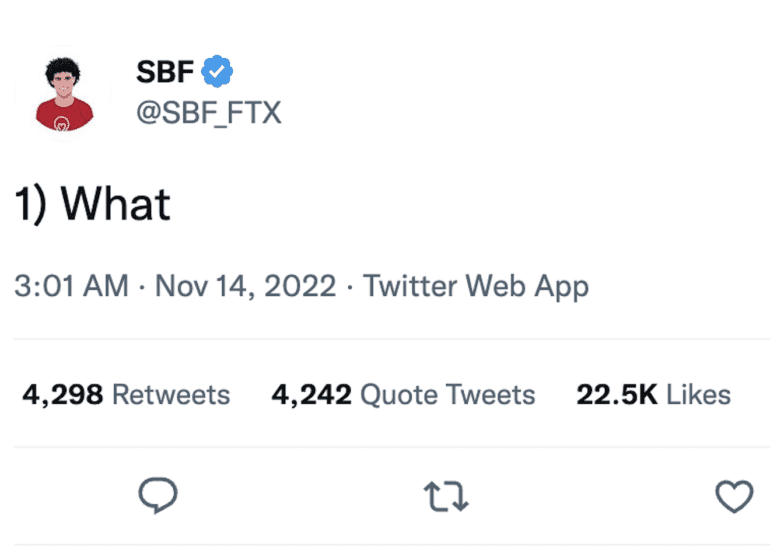The FTX drama is quickly unfolding, and days, nay, hours can make all the difference. This weekend was no exception to the roller coaster week of FTX’s demise.
All of you who thought filing for bankruptcy was the end of the chaos, read on.
Quick recap
If you have been living under a rock in ignorant bliss (or perhaps just on a media-free holiday) crypto could be in trouble.
FTX, the crypto world’s darling in the wake of the 3AC and Terra collapse, has fallen from grace. Once heralded as a savior, Sam Bankman-Fried has been ousted as a crypto criminal, potentially causing significant destruction within DeFi.

The rapid decline started last weekend on Twitter’s public stage. Binance founder announced he was selling most of his FTT (FTX’s native exchange coin), causing significant concern in the crypto community. The value of the token dropped exponentially.
A few days prior, reports showed that a large part of Alameda Research’s (FTX sister company) holdings was in FTT.
The drop in value caused significant liquidity problems for FTX, causing halts to withdrawals and eventually the offer of a takeover by Binance…
RELATED: Binance announces purchase of FTX.com
…Which Binance then pulled out of “as a result of corporate due diligence.” It also cited regulatory investigations and reports of mishandled funds.
Subsequently, FTX filed for bankruptcy on Friday, Nov. 11, despite long Twitter threads before the announcement suggesting otherwise.
While the week’s rapid decline was a whirlwind, this was only the beginning.
Draining funds
Following the bankruptcy announcement late Friday night, funds were seen to quietly drain from FTX crypto wallets in what the company described as a “hack.” The siphoned funds amounted to over $600 million.
“FTX has been hacked. FTX apps are malware. Delete them. Chat is open. Don’t go on the FTX site as it might download Trojans,” wrote an account administrator in the FTX Support Telegram chat.
FTX’s new CEO, John Ray, issued the following statement:
An investigation is underway into the perpetrators of the hack. Twitter is rife with speculation that it was an inside job conducted by Bankman-Fried’s inner circle, which has remained silent since the bankruptcy filing.
Bankman-Fried has also remained uncharacteristically quiet aside from two cryptic tweets late Sunday night reading “What” and “H.”
Bahamian regulators Investigate
In addition to the hack, the Bahamian regulators have denied asking FTX to prioritize withdrawals from clients based in the Bahamas.
The announcement, made via the company’s official Twitter account, read as such.
The regulators are now investigating criminal misconduct of the firm, although it is unclear which particular aspect is being scrutinized.
“In light of the collapse of FTX globally and the provisional liquidation of FTX Digital Markets Ltd., a team of financial investigators from the Financial Crimes Investigation Branch are working closely with the Bahamas Securities Commission to investigate if any criminal misconduct occurred,” read the statement released on Nov. 13.
The other protagonist
The other major player in this modern-day greek tragedy is Chengpeng Zhao, founder of Binance, whose actions, intentionally or not, brought Bankman-Fried’s dealings to light.
Once the primary investor in FTX, Binance was often seen as the major competitor, and Zhao has since been seen as the counterparty to Bankman-Fried’s lies. However, not everyone is convinced about the purity of his intentions.
Throughout the weekend, Zhao has taken the opportunity to promote Binance’s non-custodial wallet, Trust Wallet, and announce the launch of a crypto recovery fund for crypto projects facing a liquidity crisis. Trust Wallet’s official token, TWT, has since soared in valuation by 80%.
Zhao’s actions are not, as of yet, outwardly nefarious. While many were concerned about the FTX takeover spelling the end of decentralization in the DeFi space, the Binance founder continues to declare his support for the industry’s ideal.
He has also pledged (as always via Twitter) to continue reporting future discrepancies in competitors (sorry- “industry peers'”) activities, seemingly in the name of transparency.
Perhaps in light of this, the company also published proof of reserves in their cold wallets, amounting to over $69 billion in different cryptocurrencies, including their native coins. Holdings in their native tokens, BUSD and Binance Coin, amounted to 40%.
As always, the wheel keeps turning in crypto’s volatile landscape. Only time will tell whether Zhao will end up being the benevolent “savior” DeFi seems to long for.


